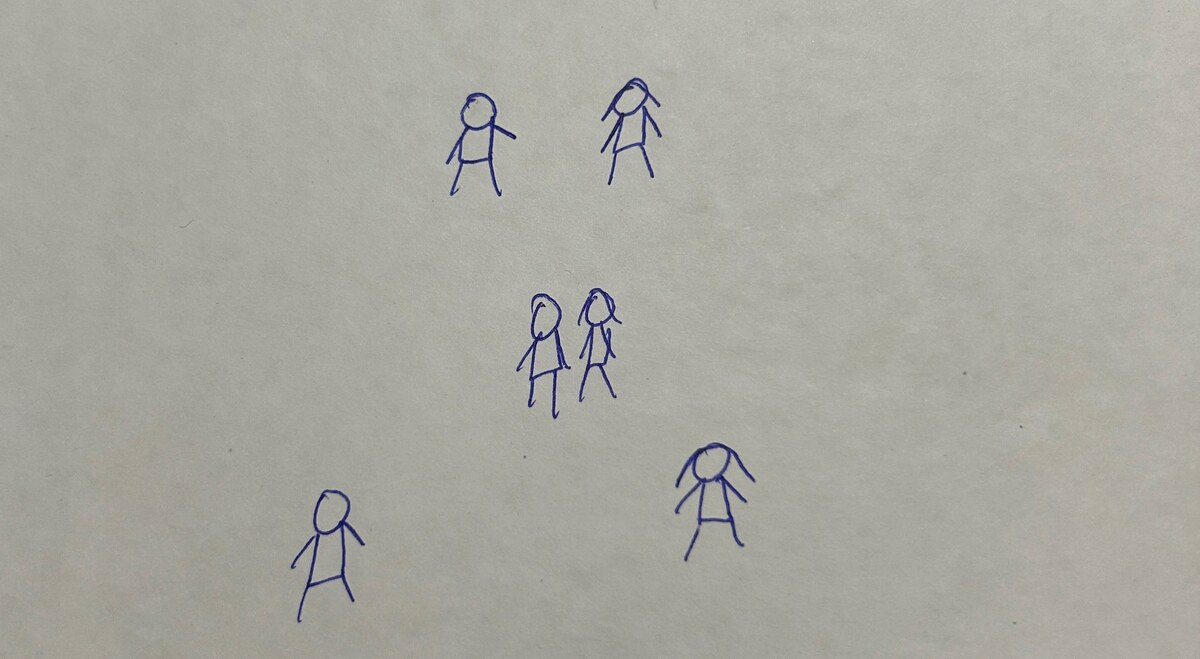Dismissive-avoidant (DA) is the attachment style of a person who values independence, self-reliance, and space more than relationships. DAs have low connection needs and avoid intimacy in relationships. They mainly derive their self-esteem from things that have nothing to do with other people—their skills, abilities, and personal accomplishments.
DAs were likely emotionally neglected in childhood by one or more caregivers. As a result, they have a negative view of other people and relationships. They’re not convinced other people will provide them with emotional connection and support.
Like all humans, DAs do want connection and belongingness. It’s just that their fear of getting hurt and emotionally neglected has put them in survival and defensive mode.1Carvallo, M., & Gabriel, S. (2006). No man is an island: The need to belong and dismissing avoidant attachment style. Personality and Social Psychology Bulletin, 32(5), 697-709. This makes them avoid seeking relationships and invest heavily in other life areas to build self-esteem.
Core beliefs of DA
“I am defective.”
“I am unsafe.”
“I am invaded.”
“I’ll get abandoned.”
DAs get triggered when something happens that touches these core beliefs/wounds. When triggered, they adopt deactivating strategies- behaviors that increase distance. Some of those deactivating strategies include:
- Shutting their partner down
- Ignoring2Goodboy, A. K., & Bolkan, S. (2011). Attachment and the use of negative relational maintenance behaviors in romantic relationships. Communication Research Reports, 28(4), 327-336.
- Defensiveness
- Passive-aggression
- Devaluation of partner
DA in the dating phase
The stages of a romantic relationship are:
- Dating phase (0-6 months)
- Honeymoon phase
- Power struggle phase
- Stability
- Commitment
- Bliss
In the dating phase, people tend to put their best foot forward because they’re trying to attract and impress their potential partner. While DAs engage in behaviors in this phase that overlap with other styles, they also engage in behaviors that are characteristic of their attachment style:
1. Deep analysis of partner
Because intimacy and vulnerability are so hard for a DA, if they’re going to get into a relationship, they want to make sure they’re making the right decision. As a result, they’ll often have a clear idea about what they want in a romantic partner. They’ll analyze their partner rigorously to make sure they don’t have any undesirable trait that they can’t put up with. One of the reasons why DAs take a long time to trust and open up is that they want to collect as much information about their potential partner as possible.
2. Fault-finding
DAs are at their best in the early stages of the dating phase. In the later stages, when the relationship moves to the commitment phase, DAs get triggered by the closeness. They’ll keep finding faults in their partner. Minor faults they had previously overlooked now seem more significant because the relationship has gotten closer. DAs want to avoid getting hurt at all costs, so they’re looking for reasons to ditch their partner before they get too close.
3. Communication
Since their connection needs are low, DAs communicate infrequently in the dating phase. This may come across as rude and neglectful to other attachment styles. When it comes to communication, DAs prefer quality over quantity. Communicating once a week and having a good conversation is 100 times better than talking daily.
DAs hate small talk. Given their highly analytical mind, they want to connect intellectually with others rather than emotionally. If you can’t have a deep conversation with them, they won’t see you as a friend, let alone a potential partner.
4. Criticism
DAs will say they don’t care about the opinions of others. It’s true for the most part. It’s part of their avoidance strategy wanting to invest their energy in things with a good return. But when they get close to someone, their desire to connect overtakes their desire to avoid. Consequently, they start caring deeply about what people close to them think of them. Since they have core wounds around shame, DAs get easily triggered by criticism or even a hint of criticism. Sometimes, they even perceive neutral statements as criticism.
5. Tests
Since DAs value their independence and space highly, they’ll test how well you can respect their space needs. They’ll ignore you for a while after connecting with you. They’ll consider it a red flag if you get mad and demand continuous attention. If you’re okay with them taking breaks and investing in their ‘me time’, that’s a green flag for them.
Similarly, they’ll express their authentic views and opinions to see if you’ll judge them for having them. If you can’t take their outrageous opinions and think they’re terrible for having them, your chances with them are doomed. If you respect their opinions, you’re a treasure of a person for them. They don’t want you to judge and shame them like their parents did. They want from you what they’ve always lacked- emotional safety.

